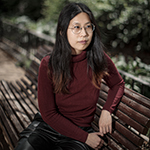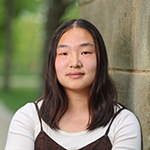Nothing
These so-called ‘enemies’ were, at least to my mind,
simply different names for sensitivity and intellect.
—Akutagawa Ryūnosuke
Only a curtain of skin separates us from the other folk.
The ear of the dying, dry wax softened
to the rhythm of the old world.
The weaver-spider exits your ear.
She staples your eyelids.
Your eyes are erupting
(She keeps them in her pockets.)
Liquor joins us and the fever
under a sky
bluer for some than for others.
Kill a rooster and seal our friendship
with blood and aguardiente.
Everyone chasing chimera, flesh torn
from stars,
shut in closets with false bottoms.
Debate is a cliché one learns to master
copying and pasting.
I a m n o t i n t e r e s t e d.
What I’m doing is drawing up strategies to dynamite
the nuclear family.
This is my conclusion:
tenderness is more powerful than rage,
but only by force.
We will swallow a shooting star to attain
the composition of helium. Vanishing
won’t be necessary because we will strike
to paralyze birth.
Nada
Los pecados capitales son solo otros
nombres de la inteligencia y la sensibilidad.
—Akutagawa Ryunosuke
Solo una cortina de piel nos separa de lxs otrxs.
El oído del moribundo, cera seca reblandecida
al ritmo del viejo mundo.
La araña tejedora sale de tu oído.
Grapa tus párpados.
Tus ojos están en erupción
(Se los guarda en los bolsillos).
Nos une el licor y la fiebre
bajo un cielo
más azul para algunxs que para otrxs.
Mata un gallo y sella nuestra amistad
con sangre y aguardiente.
Todxs persiguiendo quimera, carne arrancada
de estrellas,
encerradxs en armarios con doble fondo.
Debatir es un cliché que se aprende a dominar
copiando y pegando.
N o m e i n t e r e s a.
Yo lo que estoy es trazando estrategias para dinamitar
la familia nuclear.
Esta es mi conclusión:
la ternura es más poderosa que la rabia,
pero solo a golpes.
Nos tragaremos una estrella fugaz para conseguir
la materialidad del helio. No hará falta
desvanecerse porque nuestra huelga será
paralizar el nacimiento.
Translator’s Note:
“Nothing,” or “Nada,” comes from Paloma Chen’s Invocación a las mayorías silenciosas (Letraversal, 2022). As a Chinese American translating a Chinese Spanish collection of poetry, I resonate closely with the commentary on translation and belonging. Chen plunges the reader into the ambiguous crevice between Spanish and Mandarin, aware of the gazes of both Chinese relatives and Spaniards encountered on the street. My process aims to reflect the perspective on translation embodied in the text, embracing a starting point of uncertainty to reconstruct the Chinese diaspora identity through the self-gaze.
I am drawn to “Nada” for its sense of trappedness, and with that, a lurking explosiveness. “Nada” reflects the collection’s demand to take hold of this explosive energy, to turn the sourness of unbelonging into a drive to redefine one’s reality. In translating this poem, I pay particular attention to the colliding threads of destruction and creation, following Chen’s vision of language as a point of genesis.
Spanish-speaking readers encounter “lxs otrxs,” a gender neutral and nonbinary way of writing “the others,” and pronounced in Chen’s recording as “les otres.” The use of the x is singular; perhaps its appearance is jarring, but does not feel surprising. These choices are consistent with Chen’s tendency to make poetry out of everyday language and everyday language into poetry: language is always evolving, and words that seem new and strange when they first receive mainstream attention can become the norm. With this in mind, I aim to highlight “lxs otrxs” without unduly alienating them. In the translation, I use “folks” as a word bearing a similar usage in US English. While “folks” has certainly become more normalized in US English than the x has been in Spanish, it nonetheless aims for a similar intentional inclusivity.
In this poem, violence is central, yet casual, simply par for the course. There are by turns tearing, killing, and shutting. When translating “debatir es un cliché que se aprende a dominar / copiando y pegando,” I stuck to “copying and pasting.” “Pegando,” however, can also mean “hitting” or “striking,” adding a layer of violence to the meaning of debate learned through unoriginal means. I chose copying and pasting to strengthen a tone of despised banality, sharply contrasted when the speaker declares the intent to explode the norm of the nuclear family.
All of this explosive potential boils down to a defined purpose, which emerges as though it were foresight. A resolute future tense puts power into the hands of the speaker, compounded by the use of a collective first person. In translating, it is this sense of purpose that becomes the most crucial, and to remember that this explosion ignites not for the sake of destruction, but for the creation of a life on self-defined terms.

Paloma Chen is a Spanish-Chinese journalist, poet, writer and researcher. She has published the poetry collection Invocación a las mayorías silenciosas (Letraversal) and the multilingual poetry app Shanshui Pixel Scenes 山水像素场景. Her poems have been included in anthologies like Matria poética: una antología de poetas migrantes (La Imprenta, 2023) and Última poesía crítica. Jóvenes poetas en tiempos de colapso (Lastura, 2023).

Julia Conner is a Chinese American educator, writer, and translator from the United States South. Her translations and interviews have appeared in Action Books Blog, Asymptote Blog, and Poetry Northwest.

 BACK TO ISSUE
BACK TO ISSUE